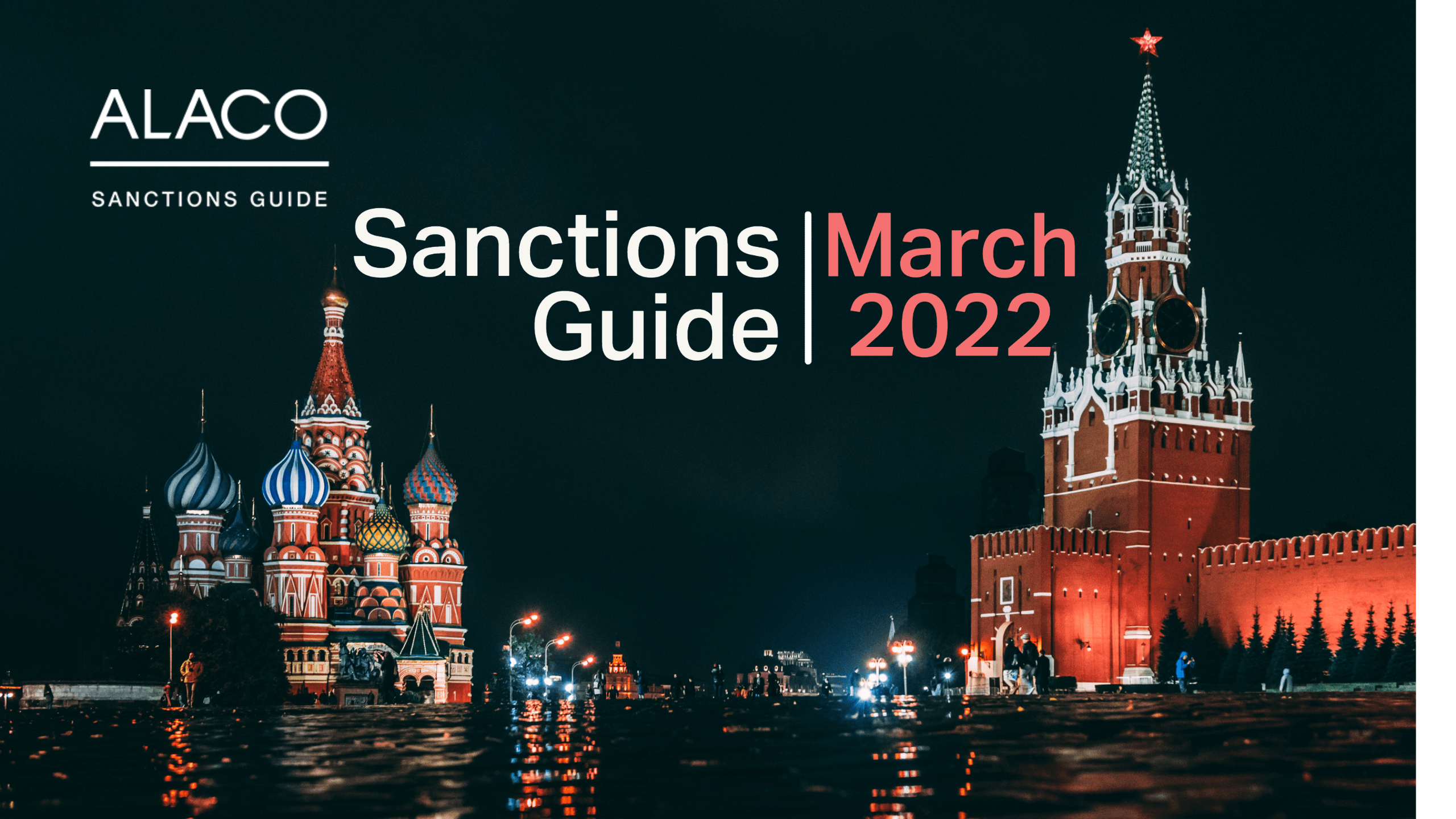By James Barr
Since Russia’s invasion of Ukraine on 24th February 2022, the EU, UK and US, alongside other Western partners, have imposed increasingly severe and wide-ranging sanctions against Russia. The sanctions imposed to date have already gone far beyond targeting those directly involved in the destabilisation of Ukraine and now appear likely to cripple Russia’s economy and financial system. They target major actors across Russia’s key economic sectors and the state’s principal financial institutions.
The devastating impact of sanctions imposed over recent days are already being felt; even before markets opened on Monday 28th February, the Central Bank of the Russian Federation (“CBR”) more than doubled its interest rate from 9.5% to 20% in an attempt to ward off a collapse of the rouble, which over the course of Monday slumped by some 40%. CBR’s capacity to further intervene in the rouble’s devaluation will be severely restricted by Western partners having committed on Saturday 26th February to freezing its $630 billion in foreign reserves.
Coordination
A key feature of the new sanctions measures announced in recent days is the high degree of coordination amongst Western allies, as evidenced by the joint statement issued on Saturday 26th February by the European Commission, France, Germany, Italy, the UK, Canada, and the US, which announced a joint commitment to implement the following measures in the coming days and weeks:
- That selected Russian banks be removed from the SWIFT messaging system;
- That restrictive measures be implemented on CBR;
- That measures be taken to limit the sale of citizenship to wealthy Russians connected to the Russian government;
- That a “transatlantic task force” be launched to ensure the effective implementation of Western financial sanctions by identifying and freezing the assets of sanctioned individuals and companies.
While measures have yet to be taken regarding the removal of certain Russian banks from the SWIFT messaging system, on Monday 28th February the first measures pursuant to the joint statement were taken, with the US and UK implementing sanctions on the CBR, restricting their nationals from undertaking financial transactions involving CBR, the Russian National Wealth Fund and the Ministry of Finance. The US additionally imposed sanctions on Russian sovereign wealth fund the Russian Direct Investment Fund and its CEO Kirill Dmitriev. The EU has followed suit and imposed a ban on dealing with CBR and has restricted Russian access to its capital markets.
Switzerland – which had so far not imposed any new measures in response to the invasion of Ukraine – announced on Monday 28th February that it would impose sanctions on Russia mirroring those imposed to date by the EU.
Escalation of Measures
UK
In marked contrast to the comparative restraint of sanctions measures imposed by the UK in the wake of Russia’s decision to recognise the independence of the Donetsk and Luhansk people’s republics, strong statements regarding the scope of coming UK sanctions have been made, although have not yet been followed up with the promised range of designations. On 24th February, Foreign Secretary Liz Truss outlined a wide-ranging list of measures to be imposed by the UK government intended to be “devastating” to the Russian economy and targeting Russian President Vladimir Putin’s inner circle. These measures are set to include a freeze on Russian bank assets in the UK, a ban on Russian state-owned and strategic private companies raising finance on the UK financial markets and asset freezes and travel bans on more than 100 companies and oligarchs close to President Putin. To date, these announced measures have translated into a full asset freeze on Russia’s second largest bank VTB Bank, the designation of a further five individuals close to President Putin, the sanctioning of five major defence companies including Rostec, Russia’s largest defence company, the banning of Russian airline Aeroflot from UK airspace and the implementation of asset freezes on President Putin and Foreign Minister Sergey Lavrov, the latter measure in line with both the EU and US.
On 28th February, in addition to restrictions imposed on CBR, the UK government imposed a full asset freeze on a further three Russian banks: national development bank VEB and mid-sized lenders Sovcombank and Bank Otkritie. Foreign Secretary Truss also announced that new legislation would be introduced which would ban exports to Russia across a range of sectors, including high-end technological equipment such as microelectronics, marine and navigation equipment. On 1st March the UK also imposed full restrictions on dealings with Sberbank.
EU
Following a 24th February meeting of the European Council, on 25th February the EU designated 98 new individuals, including President Putin and Foreign Minister Lavrov, members of the National Security Council, members of the Russian State Duma not previously designated and individuals deemed to have facilitated Russian military aggression from Belarus. Furthermore, a new and wide-ranging sanctions package was introduced on 25th February which targeted the financial, energy, transport and technology sectors, in addition to new restrictions on diplomatic visas. These sanctions include prohibitions on:
- Russian deposits above €100,000 in EU banks;
- Russian accounts held by EU central securities depositories;
- the sale of euro-denominated securities to Russian clients;
- the issue of bonds shares or loans in the EU for refinancing by Alfa-Bank and Bank Otkritie;
- the sale, supply, transfer or export to Russia of technologies in oil refining and restrictions for related services;
- the export of aircraft, spare parts and equipment to Russian airlines, as well as to the Russian space industry.
Asset freezes were imposed on Bank Rossiya and Promsvyazbank and entities including arms maker Almaz-Antey, truck-maker Kamaz, Novorossiysk Commercial Sea Port, defence company Rostec, Russian Railways, nuclear submarine maker Sevmash, hydrocarbons shipping company Sovcomflot and the country’s largest shipbuilder United Shipbuilding Corporation were added to EU sanctions lists.
On 27th February, European Commission President Ursula von der Leyen announced that the EU would close its airspace to Russian aircraft, ban state-owned television network Russia Today and news agency Sputnik and impose a ban on the importation of certain products from Belarus – from whose territory the invasion was partly launched – including mineral fuels, tobacco, wood, timber, cement, iron and steel. In an unprecedented move, von der Leyen also announced that the EU would provide some €500 million in arms and other aid to the Ukrainian military.
On 28th February the EU announced further sanctions on Russia, including designations of key political and business leaders and military personnel. Among those sanctioned are Alisher Usmanov, a major mining and technology magnate, as well as Mikhail Fridman and Petr Aven, both of whom founded Alfa Bank, one of Russia’s largest financial groups. Igor Sechin and Nikolay Tokarev, who are respectively the CEO’s of state-owned Rosneft and Transneft, were also sanctioned. Other EU measures are aimed at restricting access to European capital markets and transactions with the Russian Central Bank are prohibited – there is also a ban on aircraft owned by Russians or Russian carriers landing in the EU.
US
Arguably the most damaging measures to Russia’s economy and financial sector to date have been imposed by the US which has imposed “correspondent and payable-through account sanctions” – on Russia’s largest bank, Sberbank, essentially cutting the bank off from the US financial system. Full blocking sanctions have also been imposed on VTB Bank, Russia’s second-biggest lender, in addition to Bank Otkritie, Sovcombank and Novikombank. The US has additionally imposed debt and equity restrictions on Alfa-Bank, Russian Agricultural Bank, Credit Bank of Moscow and Gazprombank. A total of 24 Belarusian individuals and entities were also sanctioned on 24th February due to Belarus’ support for, and facilitation of, the invasion of Ukraine.


